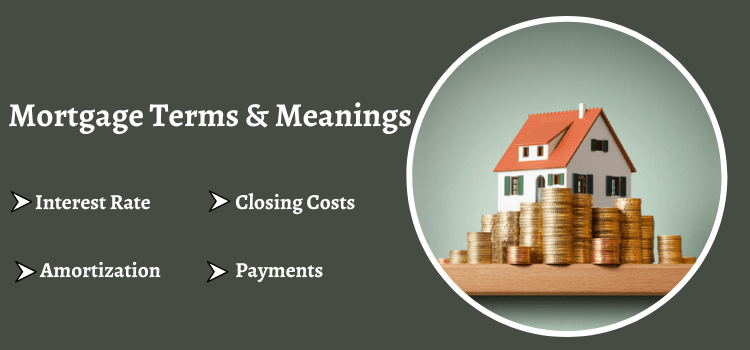When you’re ready to start buying a home, it’s important to understand all the different mortgage terms. This will help you navigate the mortgage process smoothly and confidently.
There are several different types of mortgages to choose from, including fixed-rate and adjustable-rate loans. Understanding the different mortgage terms will ensure that you get a loan that fits your needs and financial goals.
Meaning Of Interest Rate In Mortgage Term
An interest rate is a percentage of the loan’s principal. It’s the amount that a lender charges you on top of your money for using it as collateral, such as for your home mortgage or other types of loans. It’s also the amount that savers earn at banks and credit unions by keeping their money in savings accounts or certificates of deposit (CDs).
The interest rate determines how much you pay to borrow money from a lender, and it can affect your monthly payments, too. This is why you should always shop around for the best mortgage rates possible.

A mortgage is a type of loan that allows you to purchase a home with little to no money down. The loan is secured by the home’s value, so if you stop making payments or default on your mortgage, the lender can repossess the property.
When you choose a mortgage, you need to consider the interest rate and other fees you may have to pay. These can include prepaid interest, private mortgage insurance (PMI), closing costs, and mortgage points.
The interest rate you select is determined by a few factors, including current market conditions and how much risk the lender perceives your borrowing to be. You can improve your chances of getting a lower interest rate by improving your credit score or paying down debt.
Another option is an adjustable-rate mortgage (ARM), which offers a fixed interest rate for a set number of years. After that, the interest rate adjusts based on changes in market rates.
ARMs are ideal for first-time homeowners or those who want to take advantage of low-interest rates while they still can. However, if you plan to stay in the house for a long time, it’s best to choose a fixed-rate mortgage.
Finally, it’s important to understand that a lower interest rate will reduce the amount you pay in interest over the life of your mortgage. It will also make your payments easier to manage, and you can use the extra cash for other things in your budget or save it for emergencies.
Meaning of Amortization in Mortgage Term
The different mortgage terms and their meanings can be confusing, but understanding what they mean will help you better manage your financial obligations. One term you’ll come across is amortization, which refers to how a loan is paid off over time.
Amortization is a common feature of home loans, auto loans, and other types of debt. It involves dividing the loan balance into two parts, interest, and principal, and paying them off with monthly payments over a specific period of time.
Generally speaking, the more of a loan payment you make that goes toward interest, the less the remaining loan balance will be. Amortization is a useful tool that can save you money and keep your credit score high as you pay off your debts over time.
An amortization schedule is a spreadsheet or table that shows your loan payments in a logical way. It also lets you calculate your future home equity and determine whether you should refinance or recast your loan.
Most amortization schedules include a column for the period, which represents how long each loan is expected to last. A table will also show how many payments are required to reduce your outstanding balance to zero.
The number of payments will depend on your lender’s rules, but generally speaking, they should be equal to a fixed amount per month. Initially, most of your payments will go toward paying off interest. But in later years, a larger part will reduce your outstanding balance to principle.
Some lenders may allow you to make additional payments if desired, but that won’t affect your original repayment amount. It’s best to plan out your payment amounts ahead of time, and then adjust your monthly payments when you get a new job, have extra cash, or just want to reduce your debt.
The term amortization is also used in the accounting world to describe depreciation, which is the gradual reduction of the value of assets over their usable life. This is particularly true of physical assets, such as real estate or tangible items, but it can apply to intangible assets like patents and trademarks as well.
Meaning of Payments in Mortgage Term
The payments are the bread and butter of any homeowner or aspiring homeowner. For starters, you’ll want to find out what type of mortgage you have so you can tailor your payment strategy to suit your needs. While you’re at it, you might as well take the time to review the loan paperwork and the terms and conditions associated with it. Your best bet is to ask questions of your lending reps and make sure you’re getting a fair price on your mortgage. Fortunately, most lenders are happy to chat with you about your mortgage and make recommendations based on your unique situation.
Meaning of Closing Costs in Mortgage Term
Closing costs are fees you pay to close on a mortgage, and they can vary significantly by lender, home location, and type of loan. In general, closing costs can be between 2% and 5% of the purchase price of your home.
During the loan process, you may receive a Good Faith Estimate or a Closing Disclosure Statement from your lender that outlines all of your closing costs. These documents are designed to protect you and to ensure you understand what you’re paying for during the loan process. If you have questions about any of these documents or if there are significant increases in any of the fees included, it’s important to ask your lender for clarification or to ask for an explanation of any new charges.
There are a wide variety of different closing costs, but they generally fall into one of four categories: appraisal, inspection, title insurance, and mortgage origination. The first category, appraisal, is an estimate of your home’s value based on market conditions. It’s a standard part of the process for most homebuyers, and it’s often a required fee for government-backed loans like FHA loans.
The second category, inspection, is an assessment of the condition of your home. It’s a common requirement for buyers, and it usually costs an average of $375 to $744.
Finally, there’s mortgage origination, a fee that lenders charge to process and underwrite your loan. This can be between 0.5% and 1% of the total loan amount, and it includes fees such as running your credit report and document recording fees on the deed and mortgage.
Closing costs can be an unexpected surprise for many buyers, and they can make the process of buying a home incredibly stressful. That’s why it’s so important to budget properly and estimate what you will be spending on closing costs.
Fortunately, most lenders will provide you with a Good Faith Estimate or Closing Disclosure Statement before the closing process begins. The cost of these documents can vary widely from lender to lender, so it’s a good idea to get several loan estimates before making a final decision. Then, you can compare your lender’s fees and see if you can negotiate any of them.






Leave a Reply